Among the symptoms of autism spectrum disorder are difficulties learning, communicating, and interacting socially. Interactions with others and the way you act or manage certain situations are both examples of social interaction. As part of this, you will be able to interpret social cues, solve problems, and respond appropriately. Spectrum disorders are characterized by varying symptoms and severity between individuals. The capabilities of some people with autism range from being completely independent to needing considerable assistance with the basics of daily life. Take an in-depth look and know things about autism spectrum disorders.
Things to Consider About Autism Spectrum Disorder
Social communication and interaction are often difficult for people with ASD, and their interests and behaviors are restricted. It is also possible for people with Autism Spectrum Disorder to learn, move, or pay attention in a different way. Despite this, some people without autism might also experience some of the symptoms. These characteristics can, however, be very challenging for people with autism spectrum disorders. Let’s have a look at things to know about autism spectrum disorder:
- Autism doesn’t go away with time
- There is a great deal of empathy among people on the spectrum
- Quality friendships are prevalent among those on the spectrum
- A person on the spectrum does not necessarily possess savant skills
- Vaccination does not cause autism
- Humor can be a great asset to people on the spectrum
- Violence is not more prevalent among people on the spectrum
- A significant number of people with autism have successful romantic relationships
- Individuals on the spectrum do not all have intellectual disabilities
- Spectrum individuals are not all the same
Autism doesn’t go away with time
It is believed that autism stems from biological differences that have an impact on brain development. A person with autism suffers from the condition all their lives. However, a child can still make significant improvements in their social and language abilities over time. Autism is not something that just goes away, like all other developmental disorders.
There is a great deal of empathy among people on the spectrum
Someone with autism may have difficulty understanding subtle emotional cues such as body language or tone of voice. There is a wealth of evidence showing that children and adults on the spectrum feel empathy for others when they can express their emotions directly.
Quality friendships are prevalent among those on the spectrum
Sometimes, making friends can be difficult due to difficulties with social interaction and anxiety. The lack of desire to form friendships should never be mistaken for a lack of desire to make friends. There is no doubt that children and adults on the spectrum enjoy socializing, even if it requires different ways of interacting.
A person on the spectrum does not necessarily possess savant skills
Some people with autism are extremely gifted in areas such as mathematics or drawing. Yet, this represents just a small percentage of the full number of individuals diagnosed with autism. Seeing the extraordinary human that exists beyond the diagnosis is best seen past this caricature.
Vaccination does not cause autism
In fact, thousands of studies have been published on this topic, and all of them have concluded that vaccinations don’t cause autism.
Humor can be a great asset to people on the spectrum
Humor is absolutely present in people on the spectrum, despite what some people assume. Autism kids or adults can provide you with some of the funniest conversations you’ve ever heard. You may also get run over and told jokes by them.
Violence is not more prevalent among people on the spectrum
There are a lot of stories that can fool you. The violence displayed by individuals with autism spectrum disorders is no greater than that displayed by the general population.
A significant number of people with autism have successful romantic relationships
A large number of people with autism are in loving, supportive romantic relationships. In the same way that people in the general community do not choose to be in romantic relationships, not every person with autism does. However, that does not imply that one is not capable of doing so.
Individuals on the spectrum do not all have intellectual disabilities
The spectrum has a large number of people with intellectual disabilities as well as a large number of people without. The fact that someone has communication difficulties does not automatically mean they also have intellectual disability. This means we need to assess intelligence differently. An approach that doesn’t heavily rely on communication.
Spectrum individuals are not all the same
Mathematics may not be a great fit for every child. Not every child repeats back words. Hand mannerisms and difficulty speaking are not the same thing for every child. The autism spectrum encompasses a wide range of abilities, personalities and challenges that are unique to each individual. There is no one meaning to the term autism. In essence, it’s a gateway to an entirely new way of thinking.
What You Should Know About AutismCare Nepal Society?
AutismCare Nepal Society (ACNS) was founded on 2nd April, 2008 with the purpose of protecting and promoting the rights of children with autism and their families. Furthermore, the ACNS ensures that their skills are utilized to have a meaningful and effective participation in society. A number of multimedia platforms are also used by ACNS to raise awareness across the nation. Many families have benefitted from this by recognizing autism at an early age and nurturing their growth.
